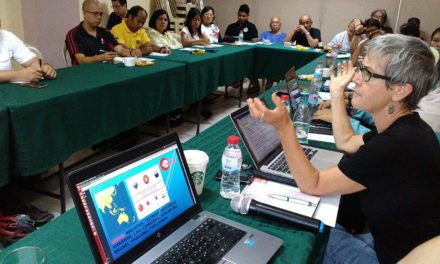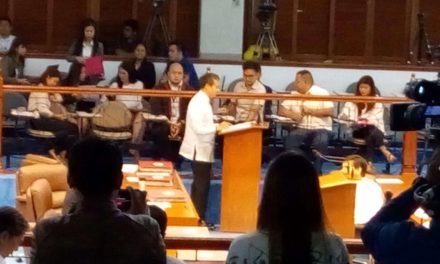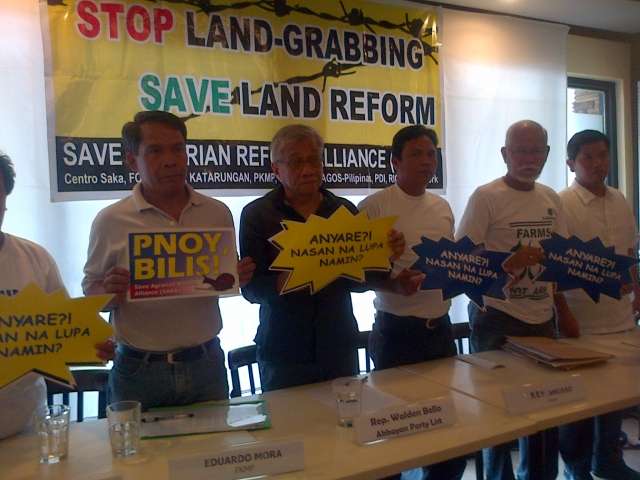July 19, 2010
The quest for justice involving wrongdoings of leaders of this country has oftentimes been frowned upon as attempt to seek revenge—to be ‘after one’s blood’ as the misguided phrase goes. Filipinos would rather make peace and reconcile, or on the other hand, criticize ourselves as having short memory. Thus is repeated the cycle of corruption, transactional politics, political patronage and abuse of authority, among others.
But it’s time to stop seeing this quest as just being personal, and even merely politically-motivated, as there are enough evidences in fact as well as in logic for seeking justice, and more so for meting out punishment where punishment is due. Focus on the Global South, through its newly-published and -launched book “Project 2010: Confronting the Legacy of the GMA Regime” not only documents, dissects and analyzes these legacies, summed up as “damaged institutions”, but also how these happened. Aya Fabros is the book’s editor.
The explanation may be found in political-economic, and yes, personal interests, but flaws in the political and legal systems, as well as in government processes, had a big role to play in allowing these interests to be further entrenched and to circumvent these very laws and systems. The investigation, as well as the insights it generated, into the details of the how’s and why’s of corruption, patronage politics, electoral fraud, abuse of power can very well be the book’s major contribution to the efforts yet to attain that “reconciliation with justice” that President Noynoy Aquino underscored in his inaugural speech.
Presence of a ‘Smoking Gun’
“Arroyo had cheated massively” in the 2004 elections, said Roberto Verzola, one of the book’s 11 authors, in his piece “Chronic Fraud in Philippine Elections”. This probably had been said before, but in Verzola’s essay, this is not assumed but the conclusion resulted from “computing the discrepancies between the official canvass and the unofficial quick count in the percentage margin of the winner over the loser in each province.”
“For additional context, 50 of the 81 provinces had discrepancies between 3% and -3%,” said Verzola in the book. He also identified seven provinces “where the worst cheating had occurred,” namely “Basilan (where 75% of the votes were switched), Sultan Kudarat (65% of the votes), Lanao del Sur (58%), Sulu (41%), Tawi-tawi (36%), Maguindanao (19%) and Lanao del Norte (16%).” Verzola, an engineer and social activist, is the Secretary-General of Halalang Marangal (Network of Citizens for Honest Elections and Truthful Statistics).
Verzola explained what he did with the figures: “For each province, take the official tally and convert Arroyo’s margin over (Fernando) Poe Jr into a percentage of the total votes. This gives the official margin per province. Do the same thing based on the unofficial NAMFREL tally. This gives a second version of the winning margin per province. Then, take the difference between the two. That is the discrepancy. The larger it is; the worse the cheating.” Based on this formula, Verzola admitted that the results of the 2004 elections could not be determined, but what was certain was that “Arroyo could have won by around 156,000 (votes), or her opponent Fernando Poe Jr. could have won by around 84,000” but that “Arroyo had cheated massively to get the one million that she claimed was her winning margin.”
In the case of the 2004 elections where the fraud was easily detectable, political conspiracy won over facts and logic, for as Verzola claimed he approached NAMFREL co-chair Bishop Dinualdo Gutierrez to present his findings, but who in turn had said “the CBCP considered the matter closed. It was all moot and academic.” According to Verzola, NAMFREL figures “showed a clear bias in favor of Arroyo, which meant that the official cheating was even worse than my estimates, based on the NAMFREL data.”
If the smoking gun was identifiable in the case of the 2004 elections, in the recent 2010 elections, it still has to be found, said Verzola during the book launch on July 13, but assured that there was indeed at the local level and that it would be important to find it to correct the errors, even the electoral fraud, that were committed in the automated elections.
Flaws in Government Systems and Processes
In “The NBN-ZTE Scandal, the Brown Bags and the President’s Budget Powers,” Jay Carizo examines the budgeting and procurement systems and policies that have allowed scandals likes the NBN-ZTE and “brown bags” to happen.
“(It) is not that the President and her advisers are ignorant of the laws, or that they lack simple common sense. The audacity to commit such atrocious acts can be attributed to certain conditions brought about by flawed laws and policies…and the prevalence of transactional politics that greases the relationship between the President and the Congress, thereby undermining the system of checks and balances,” wrote Carizo, a consultant on Local Governance and Political Economy for the local government of Daraga City in Albay.
The procurement system, for instance, is: supply-driven rather than demand-driven, decided based on the amount of kickbacks for brokers and parties involved, lacks accountability in the approval process, using too much discretion to interpret the law on the part of the implementing agencies. These flaws had enabled the NBN project to be implemented as “a loan by virtue of an executive agreement rather than the originally proposed build-operate-transfer (BOT) scheme, as the former attracts less scrutiny compared with the latter.”
But what had been excessively abused and exploited for political gains, according to author Carizo, was the president’s budget powers, which should have been checked by Congress, but was obviously not because patronage system had the upper hand.
Carizo examined each component of the presidential budgetary powers, namely the power to set the budget level, the veto power, the power to authorize the expenditure of appropriate funds, the power to suspend appropriations and the power over savings. He underscored the fact that the former president had always re-enacted in full the budget in 2001, 2004 and 2006, and partially in the other years of her nine-year government.
“When a budget is re-enacted, Congress loses the power to dictate how the resources should be managed or how the money should be spent. Hence, with re-enacted budgets, the greater the possibility of more brown bags and the greater the possibility of ensuring payments for highly irregular and overpriced projects like the NBN project,” Carizo explained in his piece.
For its part, Congress, particularly the Lower House, made sure it never displeased Arroyo by not decreasing certain budget items to protect its own Priority Development Assistance Fund (PDAF). The president’s veto power in an ideal, political interest-free situation could have been “useful to ward off insertions by Congressmen…However the same power can also be used to control Congress itself…,” said Carizo.
This same pattern of knowing the weakness of the processes and policies and the uncanny ability of the GMA government to use these flaws to its advantage could be seen in the fertilizer scam, in the appointments process and in the passage into law of the Electric Power Industry Reform Act of 2001. Related to the issue of the EPIRA was the scandal on the awarding of the Caliraya-Botocan-Kalayaan hydroelectric power plant to the Argentine Firm Industrias Metalurgicas Pescarmona Sociedad Anonima (CBK-IMPSA scandal). Wilson Fortaleza, editor of the worker’s digest, Partido ng Manggagawa, and member of the political party Sanlakas, wrote about this issue.
Journalist Luz Rimban, in her article “The Fertilizer Scam”, provides a wealth of data from government itself—the Commission on Audit—that make the said scam less “magic” and complicated to the public and even for the Office of the Ombudsman, headed by Merceditas Gutierrez who did not find any culpability in Bolante despite the recommendation of the Senate Blue Ribbon Committee of the 14th Congress to file “charges of against Bolante for plunder and technical malversation, among others.”
In “The Co-optation of Appointments Processes in the Philippines,” Cecilia Lero exposed GMA’s technique in getting her way to appoint executives in the Cabinet. She would simply appoint and re-appoint “ad interim” or “while Congress is out of session” Cabinet appointees who had been bypassed. Case in point was Margarito Teves “who was only approved by the CA in June 11, 2008 despite having served as Finance Secretary since July 12, 2005,” cited Lero, a political scientist and strategist currently pursuing her doctoral degree in political science at the University of Notre Dame.
This practice had virtually rendered the Commission on Appointments (CA) “a non-factor for GMA’s cabinet appointees.” Thus the CA had failed to perform its role of checking the president’s power of appointment.
Damaged Institutions
The president’s unchecked power of appointment had extended beyond the executive and had tainted even the judiciary, with the midnight appointment of current Chief Justice Renato Corona as the best example.
Newsbreak editor Maritess Dañguilan-Vitug in “The Midnight Chief Justice” exposes the politicization of the Supreme Court from the time GMA was sworn in as president in 2001 to take the place of deposed President Joseph Estrada to the time shortly before she stepped down as head of state. “In her nine years in power, Arroyo appointed 23 Justices to the Court, not too far from Ferdinand Marcos’s 32 during his 20 years in power,” wrote Vitug.
But probably most damaged is the Philippine Congress, in particular the House of Representatives, which had become the former president’s “rubberstamp for turning major national projects into personally profitable endeavors, staunch defender of her interest in the face of impeachment and, with streak of innovation, as the backdoor to preserve her influence over Philippine politics.”
Party-list Representative Walden Bello and co-author Sabrina Gacad detail in their article “Congress Under GMA: Revisiting HB1109 and the House of Gloria Arroyo” the different machinations of the president and her allies in this branch of government. These include the railroading of the passage of House Bill 1109 which could have paved the way for Charter change, a means to perpetuate GMA in power. On the first day of the filing of bills under the 15th Congress, now Representative Gloria Macapagal Arroyo filed a bill resurrecting Charter change.
But Bello and Gacad do not stop at discussing the different moves and decisions of the House of Representatives that clearly favored the political-economic interests of GMA, the authors also presented an agenda for reform in Congress as well as in the Constitution. Gacad is Akbayan’s media and legislative staff.
With the weakening of the executive, judiciary and legislative, the process of democratization in the Philippines had also failed, counting as one of its major victims the peace and dialogue process in Mindanao.
In “GMA and Moro Self-determination: The Limits of Illiberal Colonialism,” Herbert Docena considers the Ampatuan massacre “emblematic ending of Arroyo’s term, a coup de grace to a presidency which saw the burial of peace negotiations and the re-escalation of fighting in Mindanao.”
But on top of this heinous crime, Docena underscores the role of colonialism in keeping entrenched “false autonomy and patronage trap” as well as the “insistence on the rule of Philippine law and the rule of the Filipino majority, all backed by coercion…”
“…Colonialism has largely kept together its usual constituency: the principal beneficiaries of state-sponsored land-grabbing, bureaucrats and military officers whose career advancements are tied to those of the state, intellectuals and opinion-makers who believe that the “greatness” of a nation can only be a function of its territorial size, and even Moro elites, such as the Ampatuan…” Docena laments.
The role of the military in politics and how the military institution was politicized is further scrutinized in the piece of Aries Arugay and Nicole Curato, “Militarized Politics and a Politicized Military Under Arroyo: Prospects and Challenges for Philippine-Civil Military Relations.”
Filipinos often ride on a sense of hope to carry us through our crises and dark times, but what may be needed is hope that is based on understanding of what’s wrong in our political systems and institutions, in our leaders and in our culture. If we know how things went wrong, we may yet be lucky to know how to correct these flaws. “Project 2010: Confronting the Legacy of the GMA Regime” according to Focus, goes beyond 2010, as it attempts to look not only at the scandals and issues that defined the past government, but to study and address the flaws that have paved the way for these. – FOP
Clarissa V. Militante
Focus on the Global South
Media and Communications Outreach
*To find out more about the book and how to get a copy, check Focus’ website or get in touch with Ms Militante









